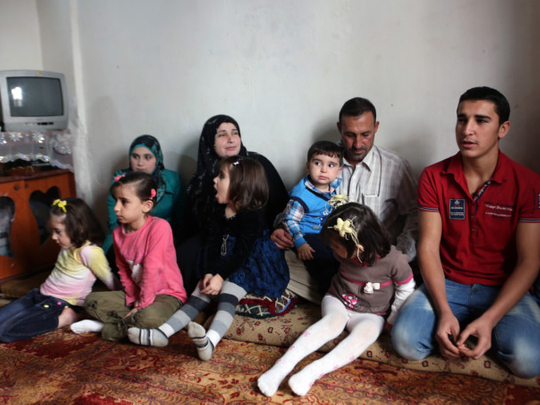
Tripoli: The Syrian teen, driven from his home by his country’s civil war, swipes across the world on a mobile phone map, over China and the blue expanse of the Pacific Ocean. He searches until finally he finds Uruguay.
For 19-year-old Ahmad Aloun and his family, the country some 12,000 kilometres away soon will become home. The tree-lined boulevards of Montevideo might as well be on another planet.
Uruguay has offered to accept 120 refugees from Syria’s civil war, the Alouns among them. It’s a small number compared to the 3 million Syrians who have fled the conflict, now in its fourth year, crowded into overwhelmed neighbouring countries or who tried to reach Europe.
The Alouns’ luck won’t spare them, however, from the challenges facing all Syrians violently uprooted by war, the alienation that distance brings, the loss of family and the challenge of a new language. Asked about his new home, Aloun offers this: “They like this one guy in particular. His name is Leo?”
He means Lionel Messi, the Argentinian football star.
The Alouns’ hometown of Maaret Al Numan, a city in northern Syria on a main highway linking Homs and Aleppo, quickly joined the uprising against President Bashar Al Assad’s rule in March 2011. Al Assad’s forces violently repressed the protests. In the ensuing war, bombs and tank fire struck all around the Alouns. Finally one night, a shell destroyed their home.
They lived first in an olive grove. Then they fled to Lebanon, eventually settling in Tripoli. The memory of war never faded from this family of eight children, especially for 4-year-old Shahd.
“This little one used to go into shock if she heard the sound of a door closing,” father and schoolteacher Mohammad Aloun says, hugging her.
Two years after they fled Syria, the UN refugee agency said the Alouns could resettle in Uruguay, offering them Spanish lessons, free health care and schooling for the children.
Mohammad Aloun hasn’t given much thought to how his conservative Muslim family will fit in. He’s unsure if there are mosques in Uruguay. They don’t know what to pack. They didn’t realise it’s currently summer in the southern hemisphere nation.
He’s just relieved to be going somewhere safe.
“Sure it will be a bit hard for them, but we’ll be one family,” he says. “Regardless of what it is like there, it won’t be worse than it was in Syria. Any country will be better.”
Not everyone will be leaving. Amira Aloun, the 26-year-old sister of Mohammad Aloun’s wife, will stay behind. Authorities rejected her asylum application. Her husband, missing in Syria, is Mohammad Aloun’s brother.
She’ll remain in Tripoli with her two daughters and her elderly mother, with no job prospects and no cash.
“I need my sister. If she leaves me, I’ll be destroyed. She’s all I have,” Amira says, bursting into tears. “I would like to be how we were in Syria — with the fear, sickness, tiredness, but we were together.”











